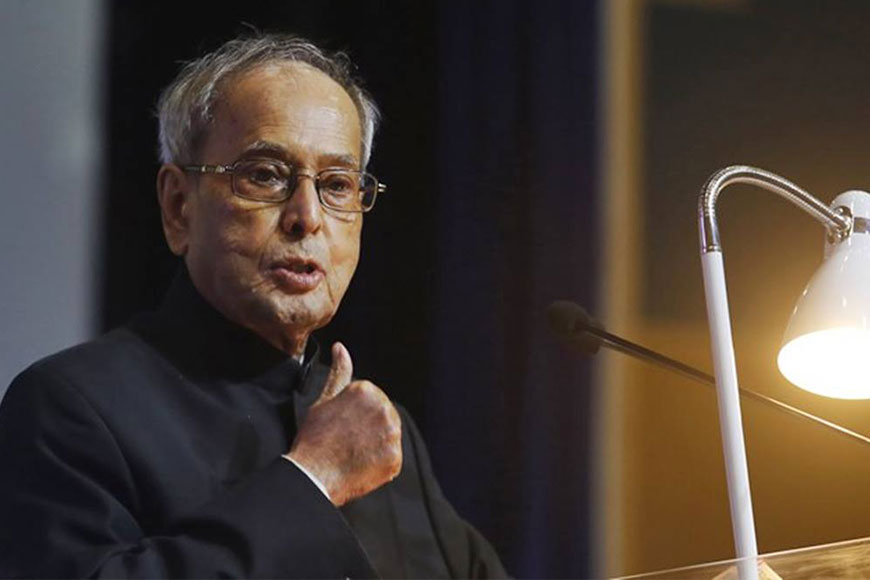Pranab Mukherjee is no more

From teaching Political Science at Kolkata’s Vidyasagar College in the 1960s to entering Rashtrapati Bhavan as India’s 13th President in 2012, Bharat Ratna Pranab Mukherjee some-how made the extraordinary journey look easy. In between, he took in such crucial Central portfolios as Finance (when he was only 47), Commerce, External Affairs, and Defence, re-mained Prime Minister Indira Gandhi’s troubleshooter-in-chief until her death in 1984, and, for many an analyst, was always ‘the Prime Minister who never was’. Quite like his close ally, the late Jyoti Basu, he was the Bengali who couldn’t cover the last mile in the race to the chair.
The quintessential backroom boy who was never trusted enough to be Prime Minister, the dyed-in-the-wool Congressman who no less a persona than Prime Minister Narendra Modi considers a ‘father figure’, the master strategist who engineered major election victories for other candidates, while never quite building up a popular base of his own, the man who al-most became Prime Minister, and yet could not win an election until 2004 – ‘Pranab babu’s career was seemingly a mass of these and other contradictions. Once again, he made the tricky adjustments between them look easy.
If there is one overarching legacy that the 84-year-old doyen leaves behind, it is this masterful ability to reconcile apparently irreconcilable ideological poles; also worth a mention would be the seeming ease with which he negotiated the turbid, murky mainstream of Indian politics, and an uncanny ability to be in the right place at the right time.
The man who returned to his village of Miriti every year for Durga Puja which he performed himself, whose speeches were liberally peppered with Sanskrit shlokas which he had at his fingertips thanks to his prodigious memory, was also the man who engineered the successful signing of the US-India Civil Nuclear Agreement and the agreement with the Nuclear Suppli-ers Group, which allowed India to participate in civilian nuclear trade despite not having signed the Nuclear Non-Proliferation Treaty. The ease with which he straddled both worlds was the essence of both the man and the politician.
The law of averages ensured that his glittering career did strike the occasional false note, however, such as his rift with Rajiv Gandhi in the months immediately following Indira Gan-dhi’s assassination. Nothing was ever said in public, but the Congress’ inner circles buzzed with speculation about how Mukherjee harboured ambitions of occupying Indira’s vacant chair. Given his position as Finance Minister as well as leader of the Congress in the Rajya Sabha at the time, most Indians saw him as a certainty for the top job anyway.
Having joined the group of senior leaders who opposed Rajiv Gandhi’s succession, Mukher-jee’s position within the government became untenable once Rajiv took over as Prime Minis-ter, and his stint in the political wilderness began. From number two in the cabinet, one of the world’s most respected Finance Ministers was reduced to heading the West Bengal Pradesh Congress Committee, nothing more, nothing less.
Realising that he would languish in anonymity, Mukherjee founded the Rashtriya Samajwadi Congress in West Bengal in 1986, and jumped headlong into the fray with the 1987 Assem-bly elections in his home state. His long track record as an ‘election engineer’ was no doubt a motivating factor. After all, this had been the bedrock of his political career since 1969, when his efforts had resulted in a major win for rank outsider and Independent candidate V.K. Krishna Menon in a Medinipur byelection. The win may have hurt the Congress, but the elec-tion manager had drawn Indira Gandhi’s attention, and it was she who recruited Mukherjee to the Congress soon after.
But Bengal in 1987 turned out to be an unmitigated disaster, a rude reality check for a man who had grown accustomed to striding the corridors of power. Mukherjee’s RSC was wiped out in the polls, cruelly exposing his lack of a mass base. Clearly, he had no future as a re-gional satrap. A chastened Mukherjee sought a reconciliation with Rajiv, and returned to the mother ship in 1989. It would take him another 15 years to win a Lok Sabha seat (Jangipur, West Bengal, 2004), which he retained in 2009.
However, it was not until Rajiv’s own assassination in 1991 that Mukherjee was truly rein-stated, courtesy incumbent Prime Minister and long-time comrade in arms P.V. Narasimha Rao, the second member of the trio of core Gandhi loyalists – Mukherjee and yet another former President, R. Venkatraman, being the other two.
Starting afresh in 1991, Mukherjee was appointed Deputy Chairman of the Planning Com-mission, and was finally re-inducted into the cabinet in 1995 as Minister for External Affairs. He was to occupy the post again from 2005-09, under the Prime Ministership of Manmohan Singh, the man whose appointment as Reserve Bank governor he had sanctioned as Finance Minister in 1982.
In fact, Manmohan Singh’s tenure witnessed a full-blown revival in Mukherjee’s political fortunes, as he was handed key portfolios - Defence (2004-06), External Affairs (2006-09) and Finance (2009-12). He was also appointed Leader of the House in the Lok Sabha.
As he eased into his role as elder statesman of the Congress, Mukherjee also became the ar-chitect of Sonia Gandhi’s rise to the party president’s post in 1998. Such was his influence as mentor and hand-holder that despite some talk of him being nominated as President in 2007, the idea was subsequently dropped, because the Union Cabinet decided that he was indispen-sable.
With his passing, Indian politics has possibly lost the last of its Mohicans, the diminutive fig-ure who generated a towering presence. In his twilight years, his mind remained the extraor-dinarily well-oiled political machine that it had been for most of his life, though his body had stopped cooperating fully. This played a not inconsiderable role in the decision to shift him upstairs to Rashtrapati Bhavan, to put it politely.
And yet, in the downward spiral in which it now finds itself, the Congress could have done with Mukherjee’s sagacity and vast experience. The man who earned a reputation as a “num-ber-crunching politician with a phenomenal memory and an unerring survival instinct” would, many Congress insiders still believe, have found a way out. He always did.
How will posterity remember him? Not as a Bharat Ratna or Padma Vibhushan, perhaps not even as the middle-class boy from a small, ordinary village in Bankura who became the Con-stitutional head of India. No, ‘Pranab babu’ will be, must be, remembered for his universal acceptability until the last day of his life, cutting across party lines, even in these turbulent, intolerant times. In the final analysis, that acceptability was what Pranab Mukherjee was made of.









